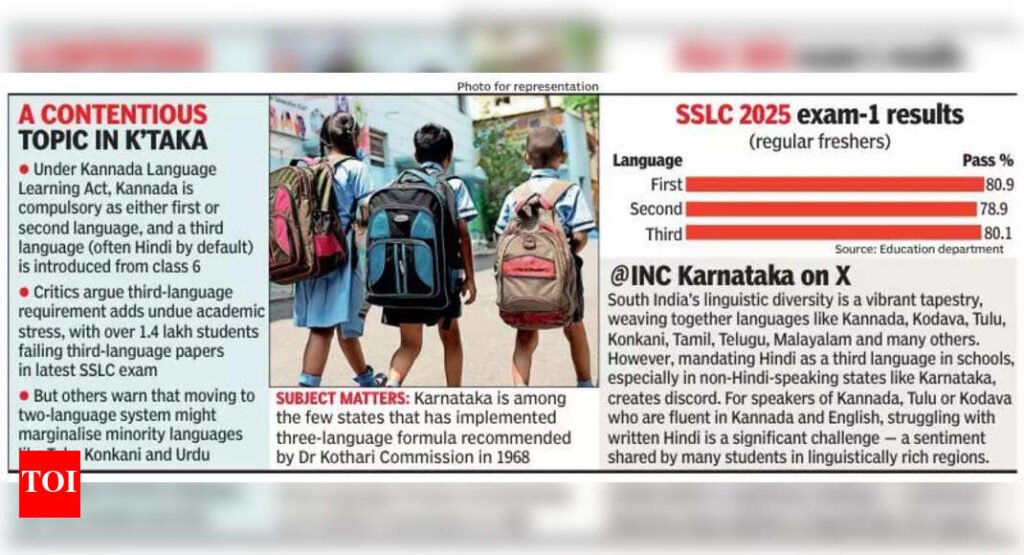Bengaluru: With Maharashtra walking back on its decision to introduce Hindi as a third language for class 1 students, Karnataka is witnessing renewed calls to shift away from the three-language formula. On Monday, chief minister Siddaramaiah said his govt is committed to a two-language policy in primary education in state schools.Pressure from various quarters has been building up for the removal of third-language requirement, with many groups calling it “linguistic imposition”. The demand has reignited debate on the need to reduce academic load and focus on language proficiency, not just exposure.Karnataka is among the few states that implemented the three-language formula recommended by the Dr Kothari Commission in 1968 and reinforced by the National Curriculum Framework.Under the Kannada Language Learning Act, 2015, Kannada must be taught as either first or second language. If Kannada is chosen first, English becomes second language from class 1. A third language — selected from among nine options, including Hindi, Sanskrit and English — is introduced from class 6.Contrary to popular belief, Hindi isn’t compulsory. Students can opt for other languages, though most govt schools do offer Hindi as the default third language.On X, the Karnataka unit of Congress said India’s strength lies in its mosaic of cultures and languages, and inclusive language policies should offer local identities and Hindi as an option, not a mandate. The Bengaluru-based NGO Namma Naadu, Namma Alvike has launched an online petition, urging the govt to drop the existing policy. The petition, which has garnered 40,000 signatures, argues that the three-language system adds unnecessary stress on students and undermines regional priorities.Meanwhile, the department of school education and literacy clarified there is no proposal under consideration to move to a two-language policy. The existing structure, it said, remains in place.Curriculum guidelines prescribe that in Class 10, second-language proficiency must match that of the first language in class 8, and third-language proficiency should align with first-language standards of class 6.In the recent SSLC exam-1, over 7.2 lakh regular freshers appeared for the third-language Hindi paper. Over 5.7 lakh passed, registering an 80.3% success rate. Across all third languages, the pass rate was 80%, with over 1.4 lakh students failing.Many experts argue this reflects unnecessary academic stress. “Three languages are a burden and affect cognitive development. We need proficiency, not mere exposure. Outside school, kids can always pick up more languages informally,” said educationist Niranjanaradhya VP.AS Seetharamu, former faculty member, Institute for Social & Economic Change, agreed partially. “A third language can be mandatory, but needn’t be tested in SSLC. It should be assessed internally from classes 6 to 9. Raising the pass mark to 40 could ensure seriousness without overburdening students.”A govt school teacher added: “CBSE tests just two languages. Why should our students be pushed harder? And after all that effort, many can’t speak Hindi fluently.”Some experts caution against switching to a two-language policy, citing Karnataka’s linguistic diversity. “Unlike Tamil Nadu, where Tamil dominates, Karnataka has Kannada, Tulu, Konkani, and Urdu. A two-language policy risks sidelining mother tongues,” one expert noted.(With inputs from Lawrence Milton in Mysuru)


